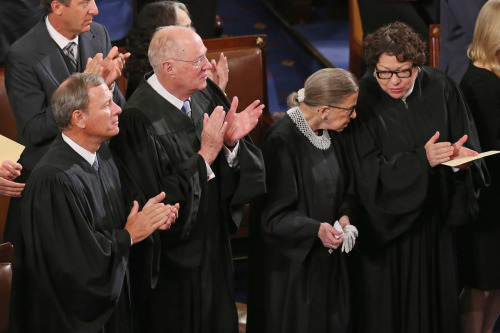Catholic Justices Scalia, Alito, Thomas Are No-shows for the Pope
By Amy Sullivan
A seat for Pope Francis’ address to Congress on Thursday was one of the most sought-after tickets in this town’s history, with each member of Congress allowed to bring along just one guest. But in the packed House chamber, there were three noticeable vacancies right in the front row. Supreme Court Justices Antonin Scalia, Samuel Alito and Clarence Thomas — all conservative Catholics — took a pass on the opportunity to hear from the leader of their church. It’s possible that all three had scheduling conflicts. Perhaps they were finally able to score tickets to “Hamilton” and decided to make a day of it in the Big Apple. The three have skipped the State of the Union in the past (Alito calls it “a childish spectacle”), objecting to the partisan nature of that gathering. More likely, however, the three justices were simply more discreet than Rep. Paul Gosar, R-Ariz., who announced to media this week that he was boycotting the pope’s talk over concerns that the pontiff was acting “like a leftist politician.” The conspicuous absences were a bit surprising, given that the current Supreme Court is sometimes characterized as the “Catholic court.” Six of the nine justices are Catholic — the other three, John Roberts, Anthony Kennedy and Sonia Sotomayor, were in attendance — and the most conservative members of the court have not been shy about identifying with their church. They have not always agreed with the church, however. Scalia has been particularly candid about his disagreements: In 2002, he bluntly told a Georgetown audience that the church’s opposition to the death penalty was simply wrong. “No authority that I know of denies the 2,000-year-old tradition of the church approving capital punishment,” said Scalia. “I don’t see why there’s been a change.” So, it might have been awkward for Scalia and his colleagues when Francis got to the “golden rule” part of his address. It was a nifty maneuver — the pope got the entire audience to stand up when he declared that “the golden rule … reminds us of our responsibility to protect and defend human life at every stage of its development.” But while the pope was undeniably referring, among other things, to the very beginning of life, his next sentence took many in the crowd by surprise. “This conviction has led me,” he continued, “to advocate at different levels for the global abolition of the death penalty. I am convinced that this way is the best, since every life is sacred, every human person is endowed with an inalienable dignity.” That presumably would have drawn a dissent from Scalia, who earlier this year, in a concurring opinion allowing a controversial lethal injection drug, compared death penalty opponents to Marie Antoinette, writing that they have “a let-them-eat cake obliviousness to the needs of others.” If the absences were indeed intentional, they would stand in stark contrast to Francis’ repeated message of dialogue over division and warnings against “the simplistic reductionism which sees only good or evil; or, if you will, the righteous and sinners.”
|
.
Any original material on these pages is copyright © BishopAccountability.org 2004. Reproduce freely with attribution.
